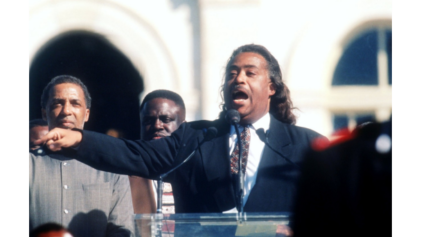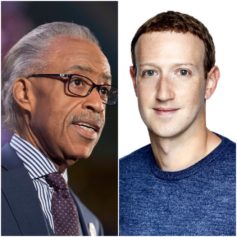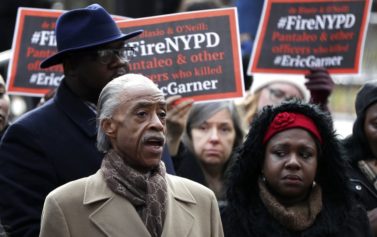A host of events will occur over the next week to commemorate the 50th anniversary of the March on Washington and Martin Luther King Jr.’s “I Have a Dream” speech, including a Saturday procession tracing the route of the 1963 march, and a second, smaller march on the anniversary date of Aug. 28, next Wednesday.
Former Presidents Jimmy Carter and Bill Clinton will speak at the Aug. 28 event, which will culminate with President Obama delivering a speech from the steps of the Lincoln Memorial where King stood 50 years ago. Church bells will ring at precisely 3 p.m., which is when King began addressing the crowd.
The two marches have different messages—Saturday’s is billed as a National Action to Reclaim the Dream, while next Wednesday’s is called the March for Jobs and Justice.
“The message is that we still have to deal with issues that are alive in the 21st century,” Rev. Al Sharpton, whose National Action Network is co-sponsoring the Saturday march with a host of other labor and civil rights groups, told the Washington Post. “While we celebrate 50 years of progress, we still have not achieved the dream of Dr. King.”
Sharpton pointed out that it wasn’t just a dream for African-Americans.
“We’re going to make sure that representatives of the LGBT community speak at the march,” he said, noting that the organizer of the 1963 march, Bayard Rustin, was openly gay, and some in the movement tried to push him aside.
“Women weren’t major speakers,” Sharpton said. “We’re going to correct that.”
The Southern Christian Leadership Conference (SCLC), the civil rights group whose first president was Dr. King, is holding its 55th convention in Washington to coincide with the commemoration.
In addition, King’s daughter Bernice will appear at the Newseum with journalist and author Simeon Booker to discuss news coverage of the civil rights movement, while Myrlie Evers-Williams, the widow of Medgar Evers, will join Julian Bond and the Rev. Jesse Jackson at the A. Philip Randolph Institute.
The SCLC convention will be focused on poverty and voting rights.
“Regrettably, the call for jobs and freedom echoes as much today as 50 years ago,” said Maynard Eaton, a spokesman for the group.
President Clinton said in a statement, “Martin Luther King’s unforgettable speech inspired millions of Americans to make a deeply personal commitment to racial equality and economic justice. Its wisdom and power continues to inspire us today. I’m honored to lend my voice to this important celebration of one of our greatest leaders and most historic days.”
The 50th Anniversary March on Washington Coalition has organized a series of events to commemorate the event, including a Global Freedom Festival, open to the public from Aug. 24-27 on the National Mall, and an Interfaith Prayer Service at the Martin Luther King, Jr. Memorial prior to the Let Freedom Ring Commemoration event on Aug. 28.
“It is an honor to participate in this ceremony as we remember a great man, a heroic leader and a noble message that still rings as true today as it did 50 years ago,” President Carter said. “This commemorative event is an opportunity to speak about Dr. King’s dream of equal rights and equal opportunity for all. Dr. King’s legacy remains an inspiration for us all on this special anniversary and will continue to for generations to come.”
“I’m honored to meet my father’s call to ‘Let freedom ring’ with President Obama, President Clinton and President Carter,” said Bernice King, chief executive officer of The King Center. “Together with people across America and the world, we will pause to mark the 50th anniversary of my father’s ‘I Have a Dream’ speech, affirming the unity of people of all races, religions and nations.”
Ironically, though it is one of the most famous speeches in American history, copyright laws make it especially difficult to find an entire version of the speech online.
“We were shocked to find that it was very difficult to find a full copy of Dr. King’s speech on YouTube,” Evan Greer, a campaign manager at Fight for the Future, an Internet free-speech advocacy group, told the Atlantic.
The group posted the full-length speech on Vimeo in January in an act of “civil disobedience,” coinciding with Martin Luther King Jr. Day, but it was promptly removed for violating Vimeo’s terms of service, Greer said. However, there’s a version on YouTube that has managed to remain on the site, having accumulated more than 80,000 views.
“When I sat down to make this video, I’m not sure I had ever seen the whole speech,” Greer said. “We thought it was incredibly important that any young person be able to hop online and watch this speech … that is as relevant today as it was when it was written.”
Subsequent to the ruling, CBS and the King estate settled the case, leaving the copyright of the speech in a somewhat confusing legal situation. EMI Publishing, which was sold to Sony in 2011, did cut a deal with the King estate in 2009 to help ensure that the speech was “accorded the same protection and same right for compensation as other copyrights.”
Because of laws that protect intellectual property after the author is deceased, viewing the whole speech online will likely be difficult until 2038, when the current copyright expires.
Greer says blocking people from viewing one of the most important speeches in American history online in 2013 is an injustice that King himself wouldn’t tolerate.
“Most people are going to turn online where they want to watch it and share it,” Greer said. “It’s incredibly important for people to find it there and share it with their community.”


